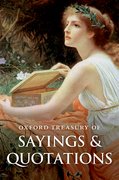
With the celebration of Queen Elizabeth II’s diamond jubilee only a few days away, it is perhaps a good moment to look back at some other long-serving monarchs of the British Isles. Inevitably, those who rule for a long time come to the throne early. Queen Victoria was 18 at her accession, and was described by Thomas Carlyle on her Coronation as “Poor little Queen! She is at an age when a girl can hardly be trusted to choose a bonnet for herself, yet a task is laid on her from which an archangel might shrink.” After her reign of 63 years, H. G. Wells thought differently: “Queen Victoria was like a great paper-weight that for half a century sat upon men’s minds, and when she was removed their ideas began to blow about all over the place haphazardly.”
Finest gentleman and wisest fool
The present queen has only recently overtaken King George III, who just fell short of 60 years. His intermittent mental illness meant that his son became regent in the later years of his reign, but attitudes to him clearly varied widely. The Tory lexicographer Dr Samuel Johnson said “Sir, they may talk of the King as they will; but he is the finest gentleman I have ever seen,” but the radical poet Shelley summed him up as “An old, mad, blind, despised, and dying king.”
James VI of Scotland was very young indeed when he came to the throne: becoming king at the age of only thirteen months and ruling for 57 years, the last 22 of those as King James I of England as well. He was described by the French King Henri IV (who ruled for a mere 21 years) as “The wisest fool in Christendom,” but is often remembered today for his Counterblast to Tobacco: “A custom loathsome to the eye, hateful to the nose, harmful to the brain, dangerous to the lungs, and in the black, stinking fume thereof, nearest resembling the horrible Stygian smoke of the pit that is bottomless.”
A nondescript king and an eternal mother
Other rulers who came to the throne as children include Henry III and Edward III. Henry ruled for 56 years after becoming king at the age of nine, but he has made so little impression on the national consciousness that Sellar and Yeatman in 1066 And All That described him as “A Nondescript King”. Edward III, on the other hand, was far from nondescript, and in the course of his 50-year reign coined quotations which are still remembered today: “Let the boy win his spurs” at the battle of Crécy, and the motto of the Order of the Garter: “Honi soit qui mal y pense [Evil be to him who evil thinks].” Another Edward, who ruled for only nine years, had his own views on long reigns and their consequences. It is said, probably apocryphally, that after the service of celebration for Queen Victoria’s diamond jubilee, the future Edward VII said to the Archbishop of Canterbury: “I have no objection whatsoever to the notion of the Eternal Father, but every objection to the concept of an eternal mother.”
The glory of my crown
Both Queen Elizabeths were 25 when they ascended the throne. As Princess Elizabeth, the present queen had said to the Commonwealth “I declare before you all that my whole life, whether it be long or short, shall be devoted to your service and the service of our great Imperial family to which we all belong.” Perhaps she was thinking of the words of her namesake, who ruled for 44 years and famously summed up her own reign in The Golden Speech of 1601: “Though God hath raised me high, yet this I count the glory of my crown: that I have reigned with your loves.”
The Queen’s 21st birthday speech, 21 April 1947
“I declare before you all that my whole life whether it be long or short shall be devoted to your service and the service of our great imperial family to which we all belong.”




[…] tangled hair into the wind, turning, ever turning…” Stories like this were picked up by Thomas Carlyle, and in turn by Charles Dickens, who in his Tale of Two Cities described women like Madame Defarge […]
[…] Her Majesty Queen Elizabeth II (The Kings and Queen of Britain). Here are a number of resources we put together for the Queen’s Diamond Jubilee in June: Composing for the Diamond Jubilee, How to Write Music Fit for a Queen, Diamonds, Royal quotations past and present […]